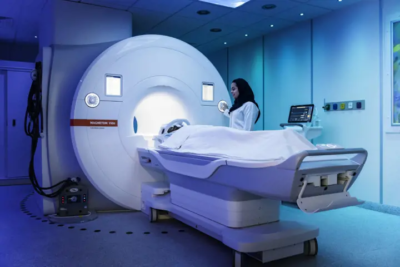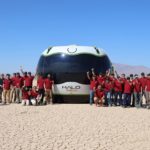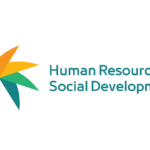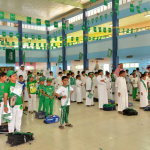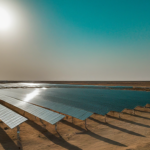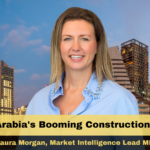
“[Economic] activity in oil exporters is benefiting from still-high energy prices, while the pace of expansion in emerging market and middle-income economies appears to be slowing, as these economies face a deep terms-of-trade shock, higher sovereign spreads and eroded market access.” The estimated $1 trillion oil windfall for crude producers, such as the UAE, in five years to the end of 2026 will allow them to invest in projects to support their future economic growth, the IMF said. Primary non-oil fiscal balances are also set to help improve economies in the six-member economic bloc of GCC. Most Gulf nations are expected to continue to save a substantial share of their oil revenues.
Middle East economic activity remains ‘resilient’ despite global headwinds, IMF says [The National]

“Globally, the World Bank estimates that by 2050, if nothing is done to prevent it, there will be 216 million people internally displaced by climate change, including 19.3 million in North Africa. Some seven percent of people in North Africa — where densely populated coastlines are among the world’s most threatened by rising waters — live less than five metres (16 feet) above sea level, according to the European Institute of the Mediterranean.”
Millions at risk of climate displacement in Middle East [AFP]

“In conversations with senior members of the Saudi royal family, officials and local business people, it’s clear that Riyadh is embarking on what I would call a “Saudi First” energy, economic and foreign policy agenda. It’s a shift several years in the making, which will have consequences for the rest of the world, chiefly via oil prices, but also when it comes to shaping Middle East diplomacy and the fight against climate change.” Javier Blas, What the New ‘Saudi First’ Policy Means for Oil and Power [Bloomberg]

“Very few countries in Asia and Africa accept the need to reevaluate their strategic calculations and restructure much of their foreign policy because of the Ukraine war, which to them is a limited border war in far-off Eastern Europe. Most are happy to side with Ukraine at the United Nations and provide humanitarian aid when possible, as Saudi Arabia recently did to the tune of $400 million. But the idea that Ukraine is now the primary lens through which all aspects of international relations must be judged and measured is simply not shared by the developed and developing worlds. And this really lies at the heart of the U.S.-Saudi misunderstanding over the oil pricing and production quota issue.”
Hussein Ibish [Diwan, Carnegie Middle East Center]

“More than 7,000 delegates attended the opening of the Future Investment Initiative in Riyadh this week—another sign, if one was needed, of Saudi Arabia’s growing influence in the business world. In the first few hours of the conference on Tuesday, huge lines were preventing many financial executives from attending panels. Make no mistake, Wall Street is out in force. JPMorgan CEO Jamie Dimon, Goldman Sachs boss David Solomon, Blackstone co-founder Stephen Schwarzman and Bridgewater’s Ray Dalio are here—showing that the lure of Saudi Arabia’s wealth trumps the recent political spat between the US and the kingdom over oil.”
-Dinesh Nair. [Bloomberg]

“The United States had a 200-year journey of transformation. We’ve had 80. We’re different people in a different place, and we are going to get there because we believe in the same thing. We believe in the set of opportunities for our people. And we’re very proud of the changes that have happened.” Princess Reema bint Bandar Al Saud, Saudi Ambassador to the United States [CNN]

“If you look at the relationship with the people side, the corporate side, the education system, you look at our institutions working together we are very close and we will get over this recent spat that I think was unwarranted.”
-Saudi Investment Minister Khalid al-Falih in remarks at the Future Investment Initiative. [Reuters]

“For the most part, I do not see U.S. companies actively avoiding Saudi Arabia due to recent political tensions. U.S. companies will be an important partner to Saudi’s investment and growth plans, in traditional sectors, but also in ‘newer’ fields including tourism, entertainment, EV production, technology and a nascent local defence industry.”
Adel Hamaizia, managing director at Highbridge Advisory and a visiting fellow at Harvard University. [Reuters]

“Taleed will provide SMEs with targeted initiatives, complementing Aramco’s other major programs designed to enhance the company’s resilient supply chain and the domestic business landscape. These include the company’s flagship localisation programme, ‘iktva’, as well as its industrial investments programme, ‘Namaat’, advanced product development center LAB7, and entrepreneurship center Wa’ed. These interlinked programmes aim to create a supportive environment in which businesses of all sizes can flourish.”
-Aramco launches Taleed program to accelerate SME growth in Saudi Arabia [Oil Review Middle East]

“From 150,000 people surveyed across 57 countries, this year the World’s Best Employers survey conducted by Forbes, the renowned business and wealth publication, showed Aramco had climbed 173 positions in one year to secure the 46th place among the 800 companies who made the list.”



